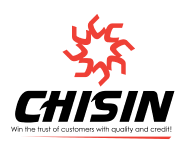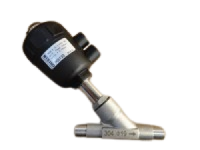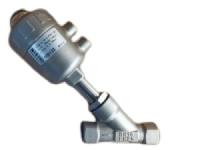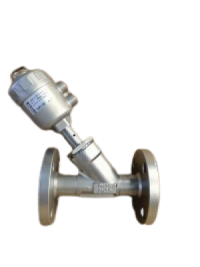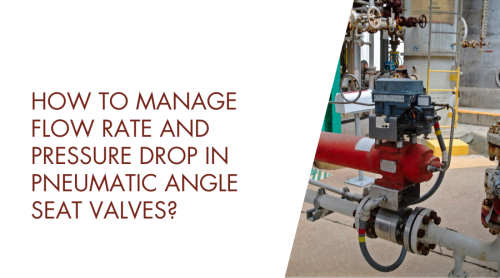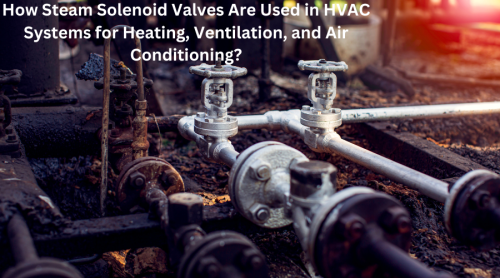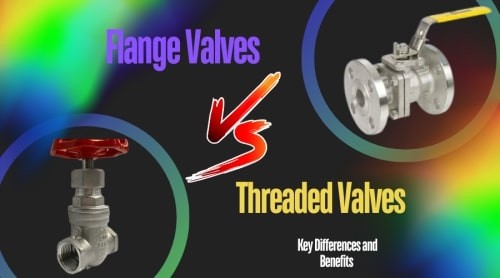Pneumatic angle sea valves are an important component that is vital for the functionality of any fluid control system like HVAC, water supply, or petroleum. Such valves perform the important function of regulating flow and transferring fluids under challenging conditions by the seamless managing of flow rate and pressure drop in a system keeping it working efficiently and preserving the condition of the system. In this blog we will engage in a detailed explanation of the working principle behind pneumatic angle seat valves, the factors that affect their performance and important tips to enhance their operational efficiency. Understanding Pneumatic Angle Seat Valves Any efficient fluid or gas pipeline system needs to maintain flow in the system, and the pneumatic angle seat valves are specialized flow control devices that regulate fluid flow in the system. Their operating mechanism consists of a pneumatic actuator that lifts the valve seat at a specific angle to ensure a smooth flow of fluid without any resistance. Angle seat valves are adaptable and can be used in all kinds of supply systems, whether air, water or any other fluid. Their adaptability makes them really useful in multiple industrial sectors. Types of Pneumatic Angle Seat Valves Single Acting Valves: feature a spring return mechanism which opens or closes when pneumatic pressure is exerted. Double Acting Valves: These valves require pneumatic pressure for both closing and opening. Key Components Actuator: delivers pneumatic power for valve operation Seat: provide an adequate seal for leakage resistance Piston/Diaphragm: drives movement within the actuator. The Role of Flow Rate and Pressure Drop in Valve Performance Flow rate in pneumatic valves The flow rate is basically the fluid volume that passes through the valve within a fixed time period. A constant and stable flow rate must be maintained for system efficiency and for, minimizing wear resistance and keeping up with the operational demand. Pressure Drop Explanation Once the fuid passes through the valve a pressure drop occurs always. If the pressure drop is a lot it is a symptom of system inefficiency as it signifies that energy is being wasted there is excessive load on the fluid system. Link Between Flow Rate and Pressure Drop There is a direct relationship between the flow rate and pressure drop. The higher the flow rate, the greater will be the pressure drop. But with a more efficient valve design and a secure system setup the negative impact of the pressure drop can be erased. A subtle balance needs to be preserved between multiple factors for maintaining a constant performance while reducing cost. Factors Affecting Flow Rate and Pressure Drop Valve Size and Design Larger valves are capable of maintaining a higher flow rate with less pressure drop. Design also helps in restricting pressure drops as they reduce turbulence and resistance. Fluid Viscosity and Types A fluid with a thicker consistency creates a higher resistance. This makes the pressure level fall higher. To avoid this it is better to study the fluid charachteristics and only then select the valve. System Configuration There are a number of system parameters that need to be taken into consideration to maintain an adequate flow. These consist of piping length, diameter, and layout configuration of the system. Layouts having sharp bends, narrow pipes or really long length increase the pressure drop. Environmental Factors Environmental conditions also have an affect on flow behavior. Temperature and altitude can interfere with fluid flow and this means that customized valves should be fitted that can handle the environmental changes. How to Manage Flow Rate in Pneumatic Angle Seat Valves Selecting the Right Valve for Your System System flow requirements vary from one fluid system to another. To make the correct choice of valves that best match the system consider features like type of fluid, operating pressure and the target flow rate. Proper Sizing Ensuring that the valve has an appropriate size is crucial for an efficient system performance. Too small valves can hinder the flow while too large valves can make the pipeline system inefficient. Adjustable Valves These kind of valves come fitted with features that allow multiple options for regulating flow and the flow can be varied according to changing demands. Flow Control Accessories There is an array of accessories that can be utilized to control the flow such as flow regulators and throttling devices. Such accessories can fine tune the system performance without putting load on the system. Managing Pressure Drop in Pneumatic Angle Seat Valves Minimizing Pressure Drop The best way to accomplish this is to keep the system design well-planned. Make use of streamlined pipe configuration and as much as possible avoid unnecessary bends. This will keep pressure drop on the safe size. Valve Configuration and Maintenance Maintenance is necessary for unobstructed fluid flow as it keeps the pipeline clean. Moreover rust can build up on the components interfering with flow and increasing resistance. With regular maintenance checks and cleaning will ensure uninterrupted fluid flow that keeps pressure fluctuations in check. Pipe Layout Should Be Adequate A well-designed pipe layout is crucial for reducing pressure losses. This can be done by utilizing wide pipes and using a uniform diameter size all over the pipeline system. Choose the Correct Valve Type for Pressure Control Fitting a system with specialized valves that are designed according to specific internal geometric design can ensure that pressure drop is not significant. Troubleshooting Flow Rate and Pressure Drop Issues Diagnosing Common Problems Reduced system efficiency, or fluid leakage is a sign of flow and pressure problems. These issues are best identified through routine monitoring. Solution Strategies Worn or damaged valves need to be replaced. The piping layout can be modified to improve flow characteristics. Air supply inconsistencies should be addressed to optimize the performance of the actuators. Improving System Efficiency Utilizing High-performance valves or advanced flow monitoring tools can have a great impact improving the overall efficiency of the system. Best Practices for Peak Flow Rate and Pressure Drop Routine Maintenance Schedule regular inspections to clean and replace worn parts. This will keep the system operating at its peak consistently. Monitoring Systems Fitting flow meters and pressure sensors for real-time insights will keep you updated about the system performance and it will be easier to take proactive adjustments in case of a problem. Training for Operators Give operators proper training on valve handling and system management to reduce operational errors and improve longevity. Using Quality Valves High-quality pneumatic angle seat valves are investments that ensure reliability and reduce the possibilities of problems arising while improving performance. Conclusion The flow rate and pressure drop in pneumatic angle seat valves should be controlled for proper maintenance of the system's efficiency and reliability. How these factors interact and choosing the appropriate components with best practices will optimize performance and save on costs. The keys to success are proactive maintenance and quality valve investment. FAQs 1. How do I know if my pneumatic angle seat valve is experiencing a pressure drop? You might notice a decrease in flow rate, inconsistent valve operation, or a drop in system pressure. 2. Can the flow rate be adjusted without replacing the valve? Yes, the flow rate can be adjusted by changing the valve's actuation method or by using flow control accessories. 3.What are the typical reasons for high pressure drop in pneumatic systems? Examples include; leakage, blocked filters, small pipes, and condensed water in the refrigeration system. 4. What makes valve sizing as a critical factor for controlling the flow rate and pressure drop? Valve sizing involves correct selection of valve sizes through appropriate means so that the flow may be adequately controlled, pressure drop may be avoided and inefficiencies may not creep in. 5. What is the best way to maintain pneumatic angle seat valves? Regularly inspect and clean the valve, check for air leaks, replace worn components, and ensure proper lubrication.
Dec-30-2024WHY CHOOSE US!

INTEGRITY
The company's name is taken from quality and integrity, and it has been in the valve industry since the 90s.

QUALITY
Wenzhou Chisin Valve Co., Ltd. has always adhered to the original quality first standard.

TECHNOLOGY
The company is proficient in valve knowledge and technology, and it is the first batch of manufacturers
